Web scraping is more popular than you may think. Individuals and companies worldwide gather publicly available data from the internet for all sorts of purposes. These include data analysis, market research, price aggregation, finding the best online deals, and more. Why would you want to use IPRoyal Proxies with ParseHub? Read on!
What Is ParseHub and How It Works
ParseHub is a GUI-based data-gathering tool. It’s a robust visual-based solution that allows everyone to create advanced data extraction tasks and workflows. More importantly, you don’t have to understand code to use it to its full potential!
This free web scraper can easily deal with JavaScript and AJAX pages, search through forms, log in on a website, open drop-down menus, and handle infinite scroll pages, tabs, and pop-ups. In other words, there’s no data out of its reach! The data you gather is available in Excel and JSON form. Finally, you can set scheduled scraping tasks with Node.js so you get the data you need on a regular basis.
Why Do You Need Proxies for ParseHub
Each website allows a set number of requests you can send from the same IP address in a specific period. Web scraping involves sending a large number of these requests in a short time for maximum efficiency.
So, when a scraper exceeds this number, the site usually blocks the IP address from which the requests are coming, like a batch of datacenter proxies. That’s where ParseHub proxies jump in.
Proxy servers replace your IP address with a brand-new one. Premium datacenter proxies offer a large number of IP addresses in different locations, so you never have to worry about any IP-based limitations.
By using rotating proxies, each request a scraper sends to a website comes from a different IP address, so the website can’t possibly distinguish them from genuine traffic. Keep in mind that datacenter proxies are easier to detect, and resort to residential ones if you require a layer of privacy.
How to Integrate IPRoyal Proxies With ParseHub
1. Subscribe to IPRoyal
Head over to our website, create an account, and log in with your credentials.
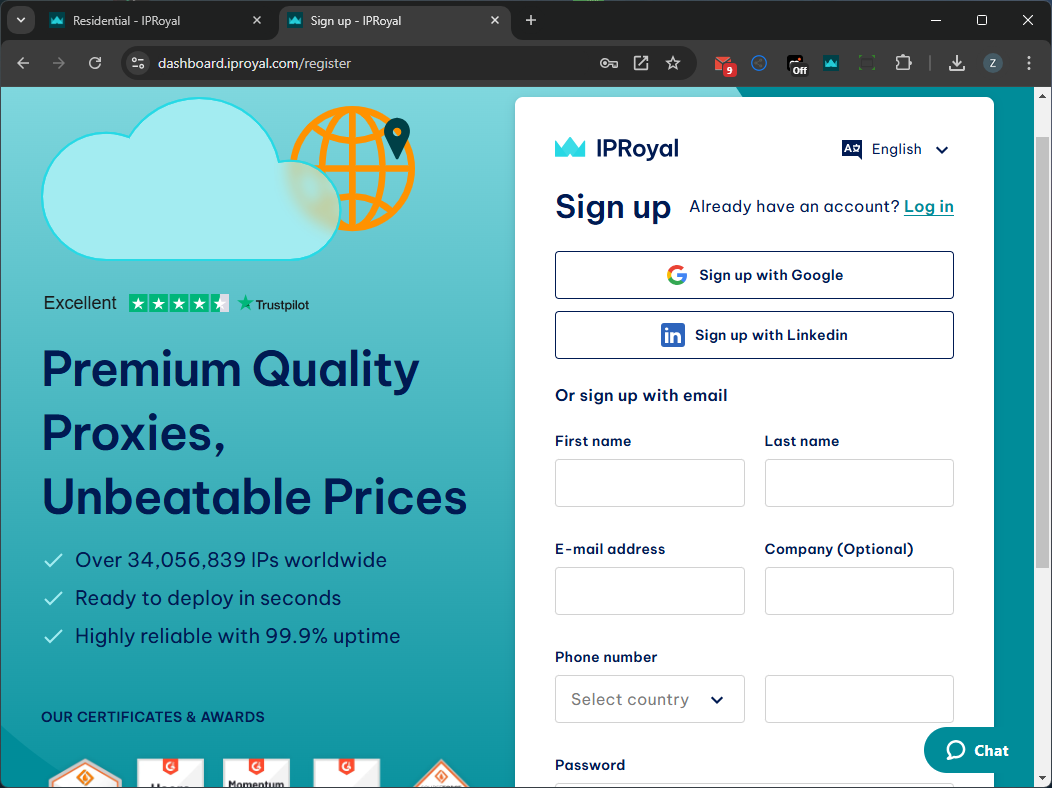
2. Choose a Proxy Type
On the left side menu, choose the desired proxy type for ParseHub proxy integration and click on it. For this example, we will use residential proxies.
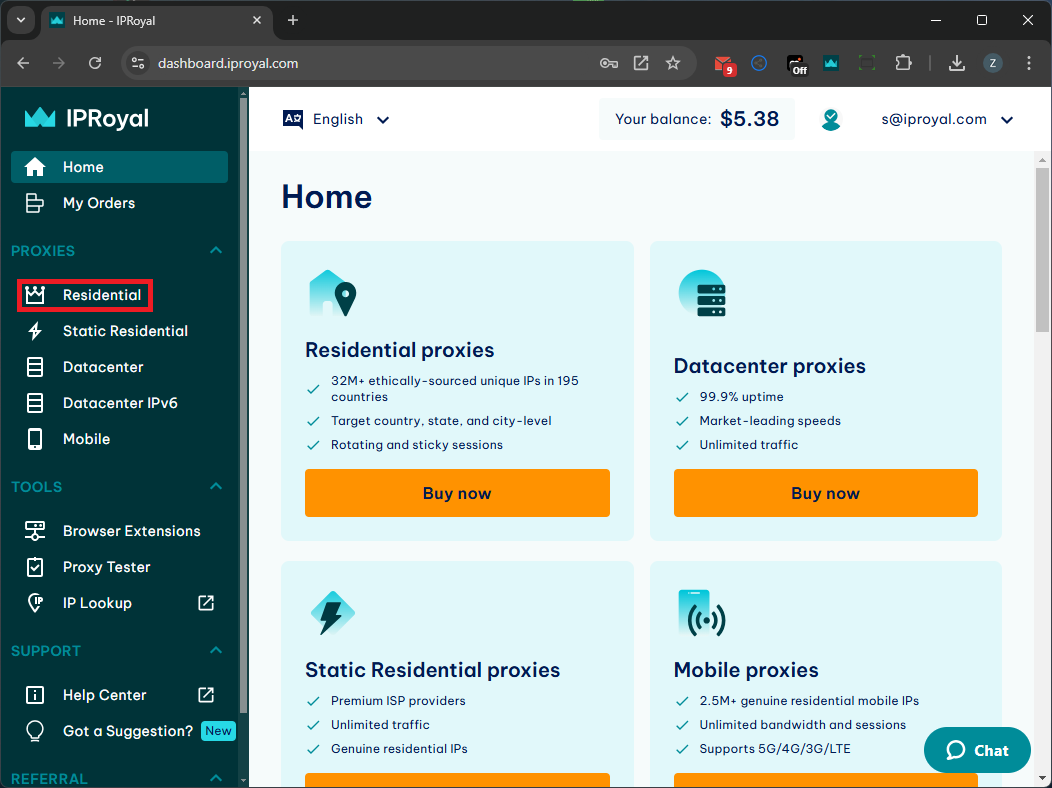
3. Select Proxy Details
Under the Proxy access section, select proxy server pool type, country, state or region, rotation options, and required proxy protocol type.
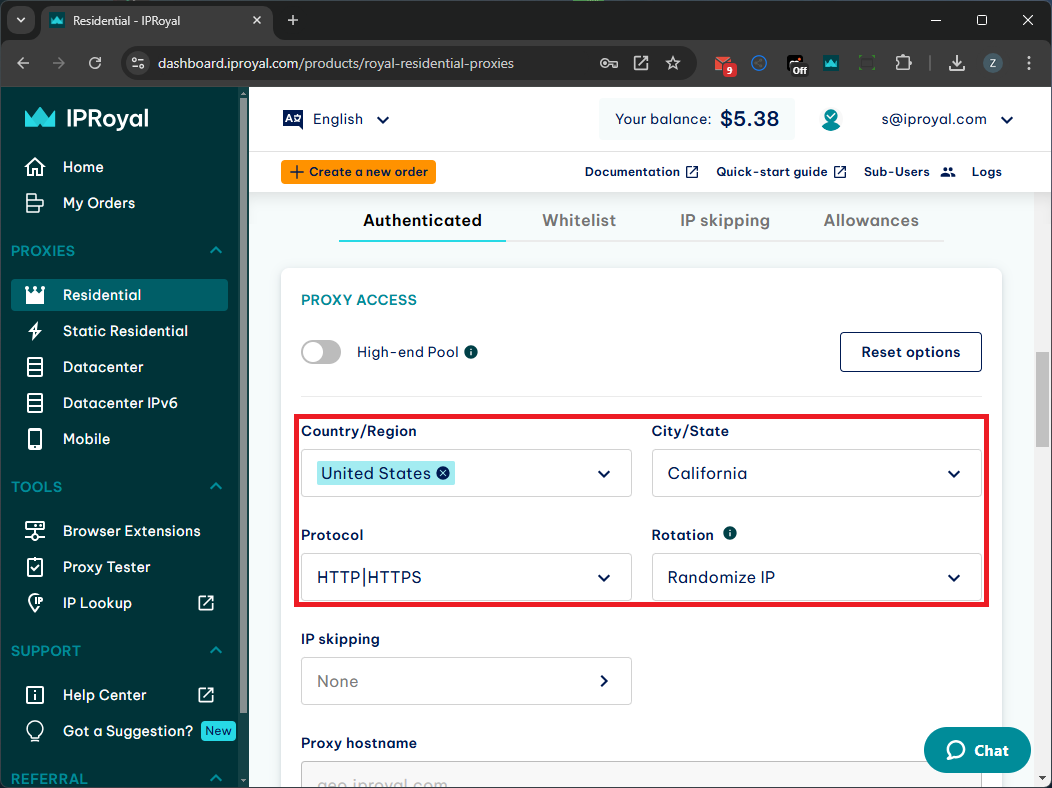
4. Copy the Proxy Credentials
Press the Copy button to copy your credential string to your clipboard. You will need to paste it into ParseHub proxy configuration section later (step 10) in this format: host:port:username:password:realm.
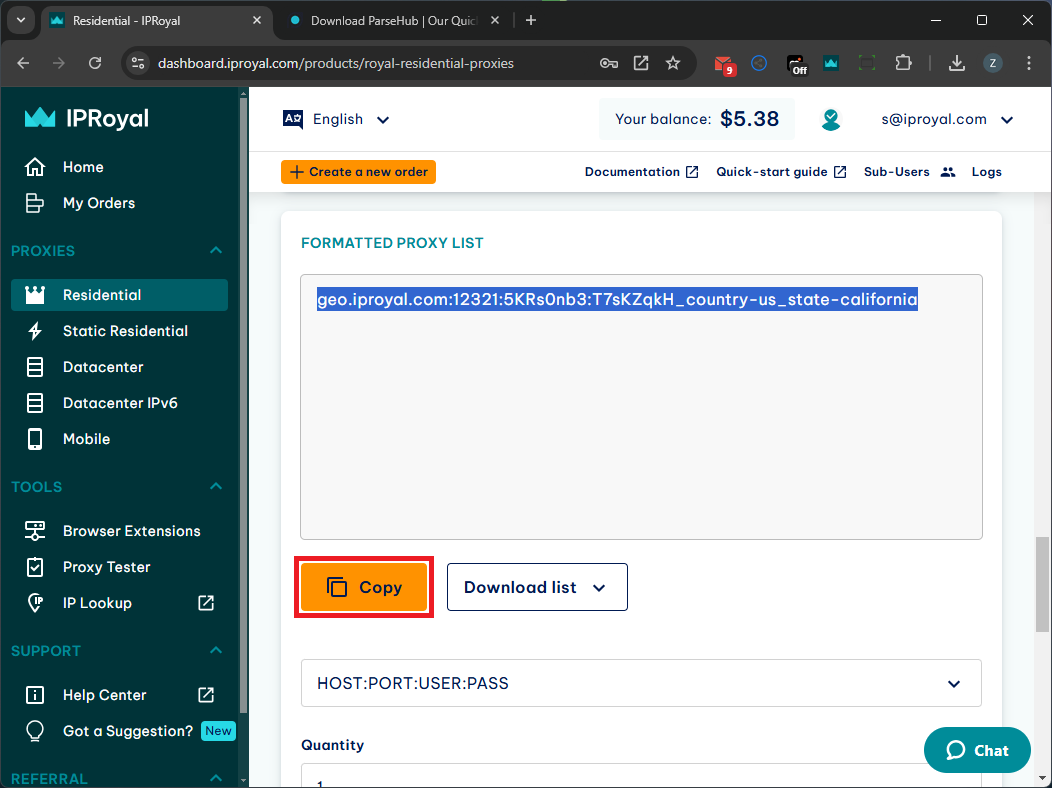
5. Download ParseHub and Install It
Go to the official ParseHub website and download it for your operating system.
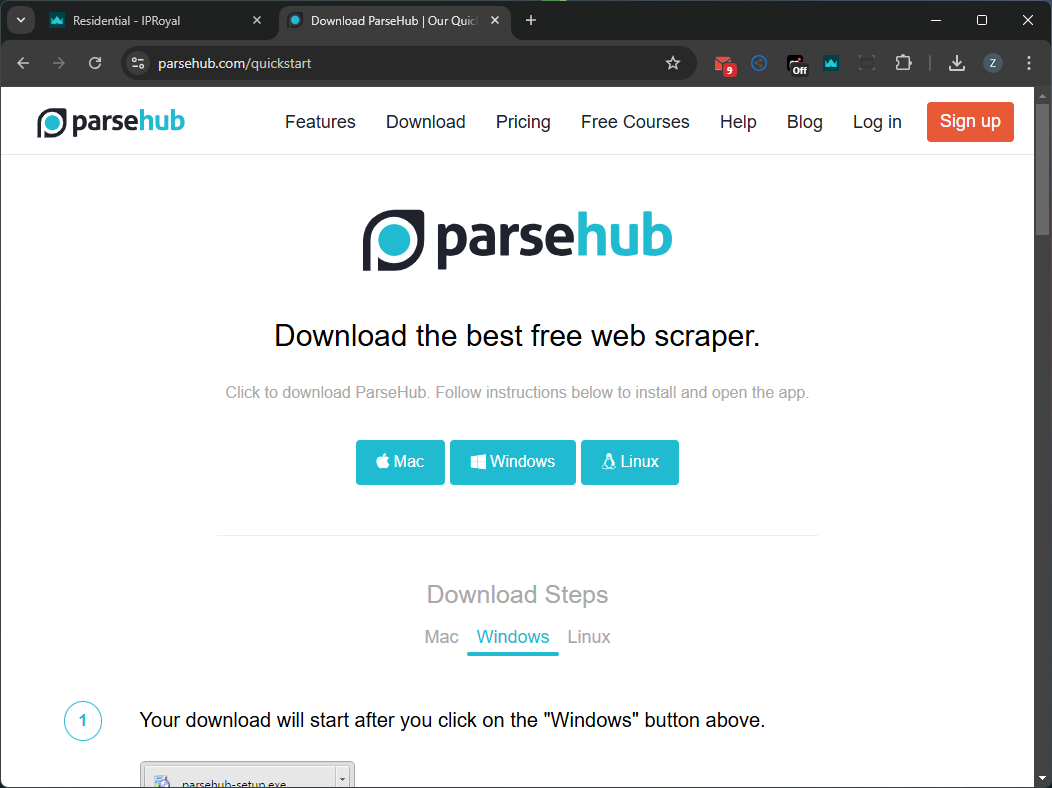
6. Start a New Project
Open ParseHub and click the New Project button.
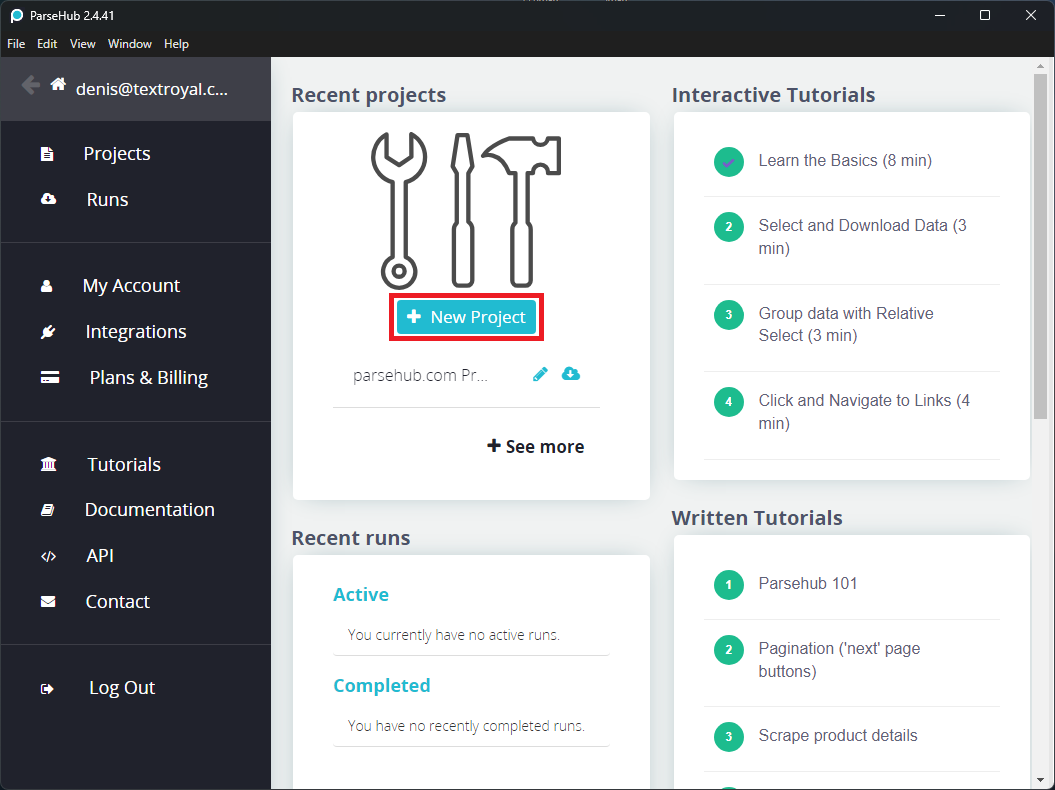
7. Enter Target URL
Enter the website address you’re going to scrape and then click the Start project on this URL button below.
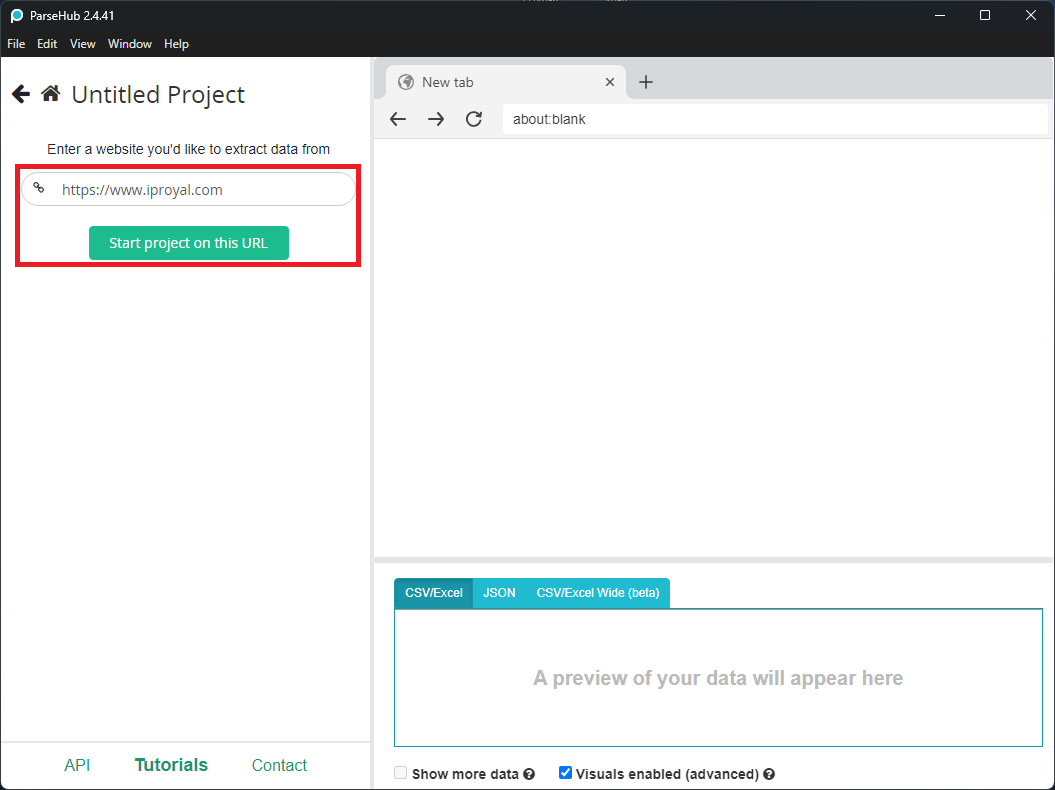
8. Go to ParseHub Options
Click on the three horizontal lines on the right and select Options.
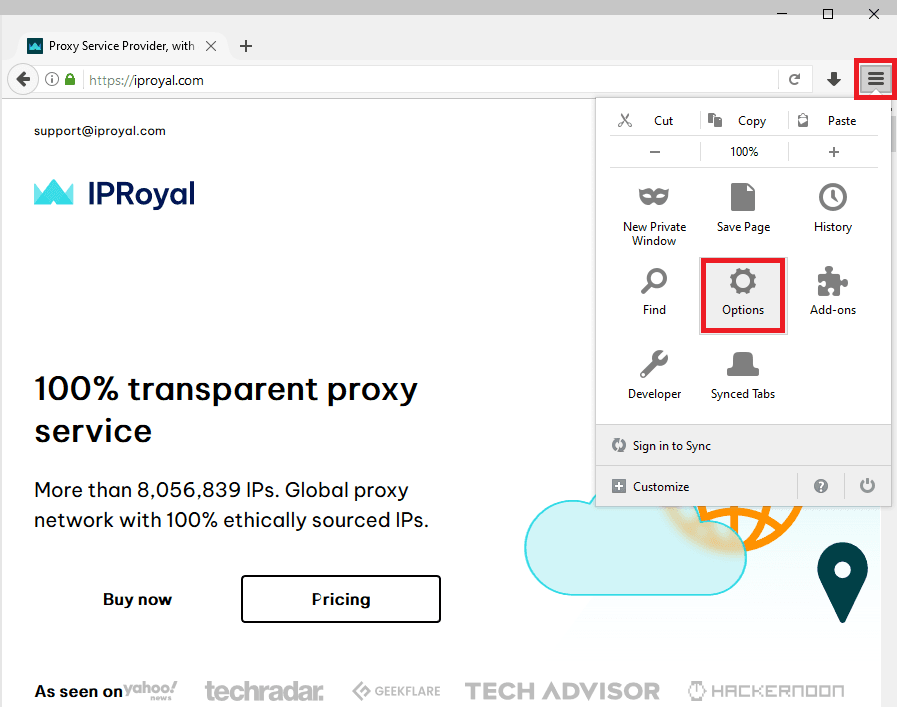
9. Go to Connection Settings
Select Advanced on the lower left, then click the Network tab, and click on the Settings button in the Connection section.
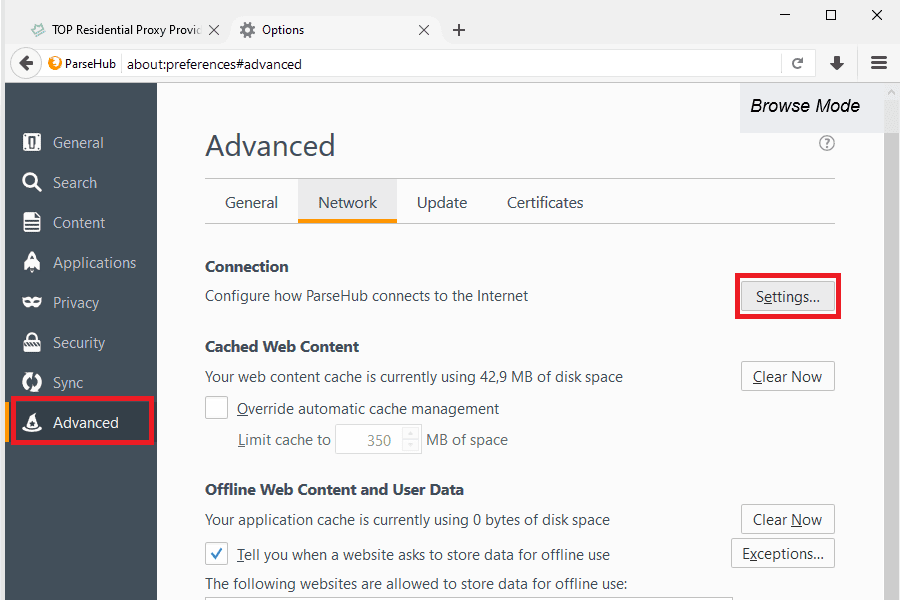
10. Configure Proxies Manually
Switch to Manual proxy configuration option from No proxy. From the string you copied at step 4, input the HTTP Proxy Host part into the HTTP Proxy field, and the Proxy Port number into the Port field on the right, then click OK.
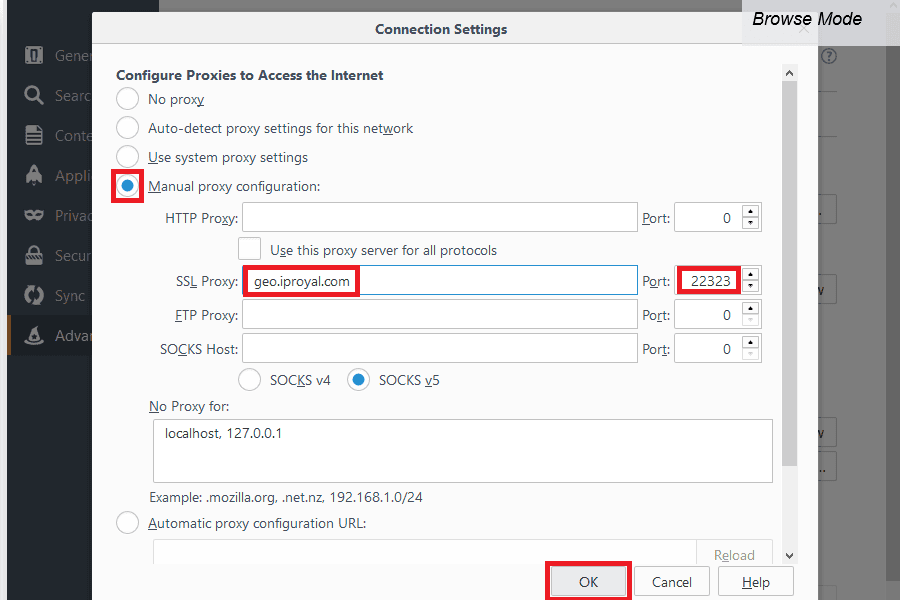
11. Authenticate Connection
Confirm and close the ParseHub options and input your user name and password in the newly opened pop-up. In this case, the “Proxy Authentication Required” stands for the realm part.

12. Format the Proxy
Click the gear icon in ParseHub next to your project name and select Settings from the menu.
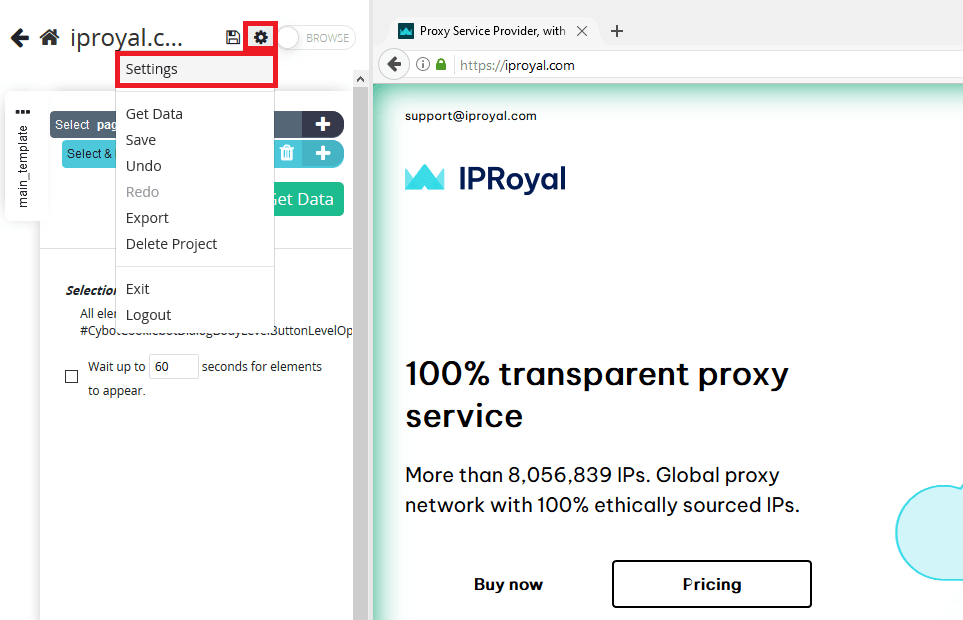
13. Enable Custom Proxies
Locate the Rotate IP Addresses option and tick the box next to it.
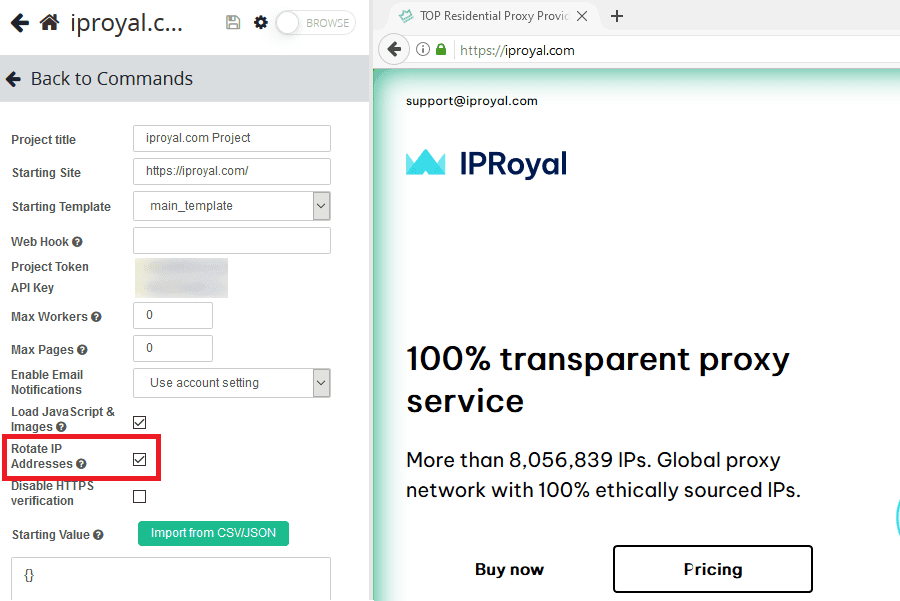
14. Paste the Formatted Proxy String
Paste the formatted proxy string from step 4 in the Custom Proxies field. In our case, it looks like this:
[hostname (geo.iproyal.com)]:[port (22323)]:[proxy username]:[proxy password]:[Proxy Authentication Required]
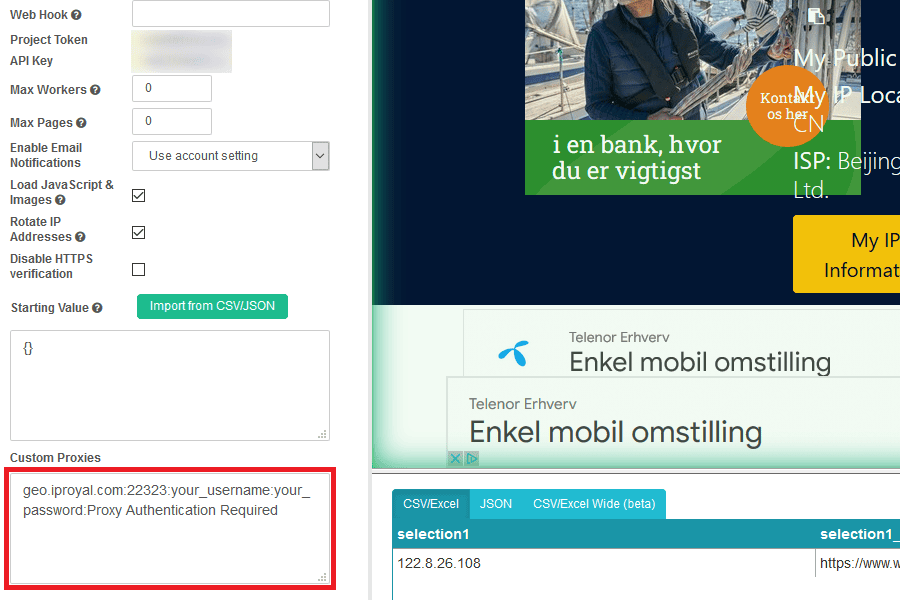
15. Verify Your Configuration
You can test ParseHub residential proxies on websites like www.showmyip.com. After loading it in ParseHub, select the IP address field and click the Get Data button.
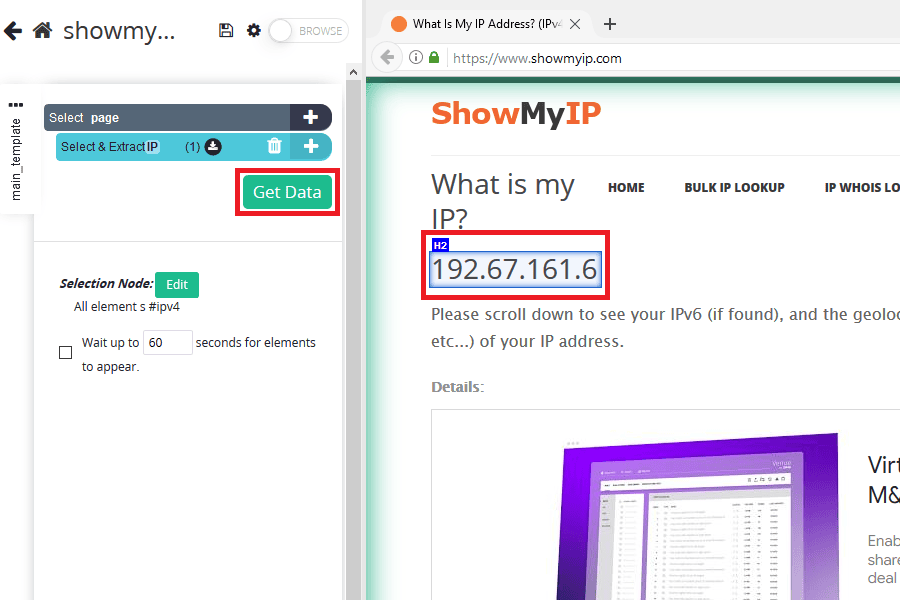
16. Run the Test
Click on the Test Run button to proceed.
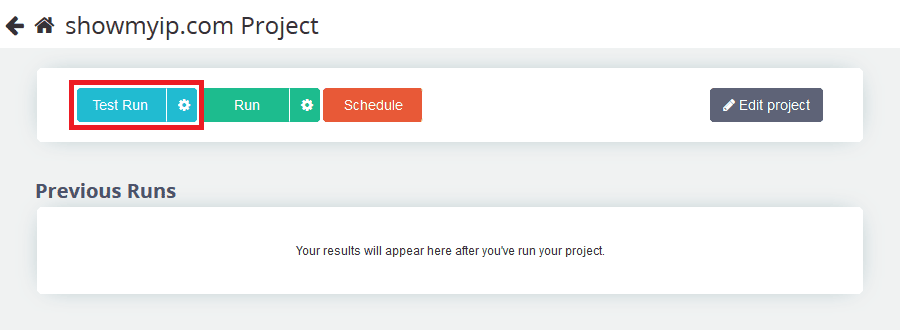
17. Verify Results
Once the test run is finally finished, you’ll see the new IP in the scrape results.
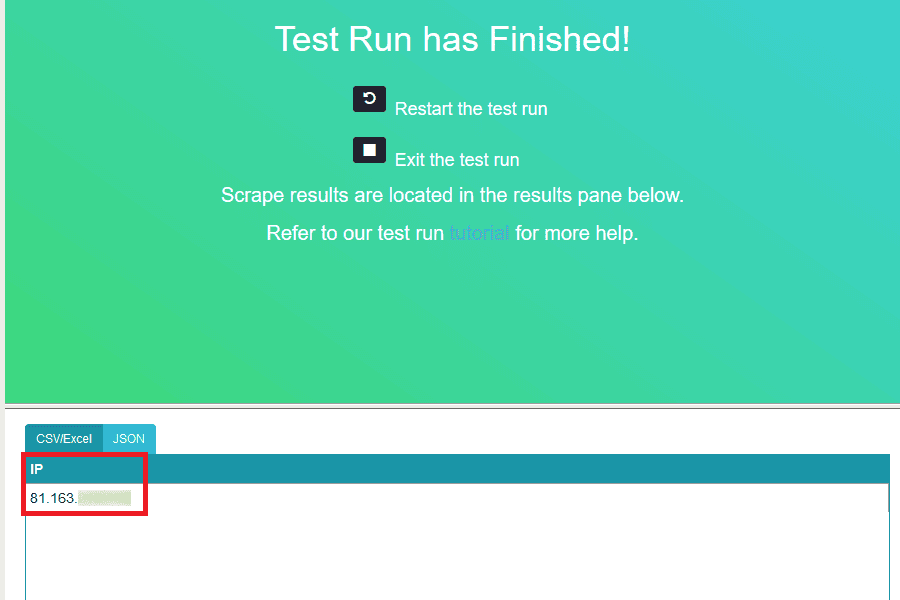
Congratulations, you’re ready to start scraping with proxies! Close all tabs except for the one with your target. Select the elements you need to scrape from your target website (make sure to turn off Browse mode) and let ParseHub work its magic.
Mastering Proxy Integration with ParseHub for Effective Data Scraping
Getting Started with ParseHub
- ParseHub is a beginner-friendly no-code web scraper.
- It easily integrates with various proxy providers.
- ParseHub is a low-cost tool for scraping public data from websites.
Understanding Proxies
- Proxies help avoid detection and IP bans.
- Residential proxies, datacenter proxies, and ISP proxies are often used for scraping.
- Proxies can be configured manually or through a proxy provider’s dashboard.
Configuring Proxies in ParseHub
- To configure proxies in ParseHub, navigate to the settings and manually input the required details.
- Enter the proxy URL and port in the HTTP Proxy field, and select the proxy type.
Proxy Credentials and Zones
- Proxy credentials, such as username and password, are required for authentication.
- Proxy zones are used to manage multiple custom proxies and switch IP addresses.
Best Practices for Proxy Integration
- Use a reliable proxy provider to ensure a high scraping success rate.
- Rotate IP addresses regularly to avoid IP blocking.
- Use custom proxies to target specific domains or websites.
Benefits of Proxy Integration
- Combining proxies with ParseHub ensures efficient and secure data scraping.
- Proxies help avoid IP blocking to reduce the risk of account suspension.
- Custom proxies can be used to target specific domains or websites, improving data extraction accuracy.
Things to Consider
- Enterprise dedicated datacenter proxies offer high performance and reliability for large-scale data scraping.
- Residential proxies are ideal for scraping public data from websites, as they mimic real user behavior.
- ISP proxies offer a balance between performance and anonymity.
Troubleshooting and Optimization
- Common issues with proxy integration include IP blocking, proxy authentication errors, and slow data extraction.
- To troubleshoot, check proxy credentials, proxy settings, and ParseHub configuration.
- Optimize proxy integration by monitoring proxy performance, rotating IP addresses, and adjusting proxy settings.
Conclusion
Although it takes quite a few steps, proxy integration with ParseHub is easier than it looks. Remember to always use the correct proxy type, like datacenter proxies, to get the best results. Datacenter proxies excel at uptime and connection speed, while residential proxies mimic genuine user behavior. Once you add proxies to ParseHub a couple of times, you’ll notice that this no-code web scraping tool is especially easy to use.



